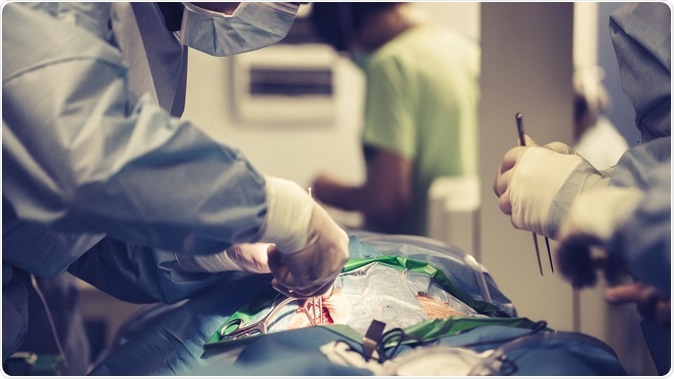A latest study has shown that sudden cardiac death could be linked to a very common heart condition – mitral valve prolapse. Sudden cardiac death occurs when the heart suddenly stops beating. This connection is a significant breakthrough say experts.
The new study titled, “Mitral valve prolapse and sudden cardiac death: a systematic review and meta-analysis,” was published in the latest issue of the journal Heart.

Team of surgeons make a dissection for aortic valve repair in cardiovascular minimally invasive surgery hospital center. Image Credit: MAD.vertise / Shutterstock
Researchers collaborating from four states had looked at over 7600 studies and noted that around 12 percent of those who suffered from sudden cardiac death with no clear precipitating factor had a mitral valve prolapse. The mitral valve regulates the blood flow between the left atrium and the left ventricle. Mitral valve prolapse is seen in 12 persons out of every 1000 population and in this condition the mitral valve does not close evenly or smoothly causing blood to flow back into the atrial chamber. Lead researcher of this new study, Rajiv Mahajan, a cardiologist at the University of Adelaide’s Centre for Heart Rhythm Disorders explained mitral valve prolapse saying that the valves “bulge, or prolapse, upward into the left atrium of the heart.” The condition is fairly common he said and most of the time it did not require any treatment and caused no symptoms.
Researchers and cardiologists from universities of Adelaide, Melbourne, NSW and Queensland have now created a registry for patients who have mitral valve prolapse and also for those who have been resuscitated after they have had a cardiac arrest or have succumbed to sudden cardiac death. This would be a prospective analysis to link the two conditions, they explain.
The researchers state that while a heart attack is a condition that occurs due to problems of blood flow while sudden cardiac death occurs when there is an “electrical malfunction” in the heart. Over years there have been evidence that mitral valve prolapse was found in people with sudden cardiac death, Mahajan said. However a scientific association has never been made. He said, “It (this new study) indicates that the incidence of sudden cardiac death in patients with mitral valve prolapse is significant at 14 in 1000 per year.”
According to one of the authors, Prashanthan Sanders, director of the centre, one in five of the sudden cardiac deaths are seen in people who have seemingly normal hearts. “This research provides insight into the need for further investigation of patients with mitral valve prolapse and high-risk conditions for serious and life-threatening cardiac arrhythmias,” he said. He said that this study looked at data from different studies and thus can be considered to be robust in its conclusions.